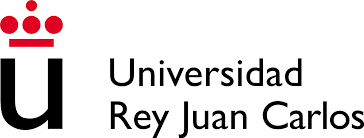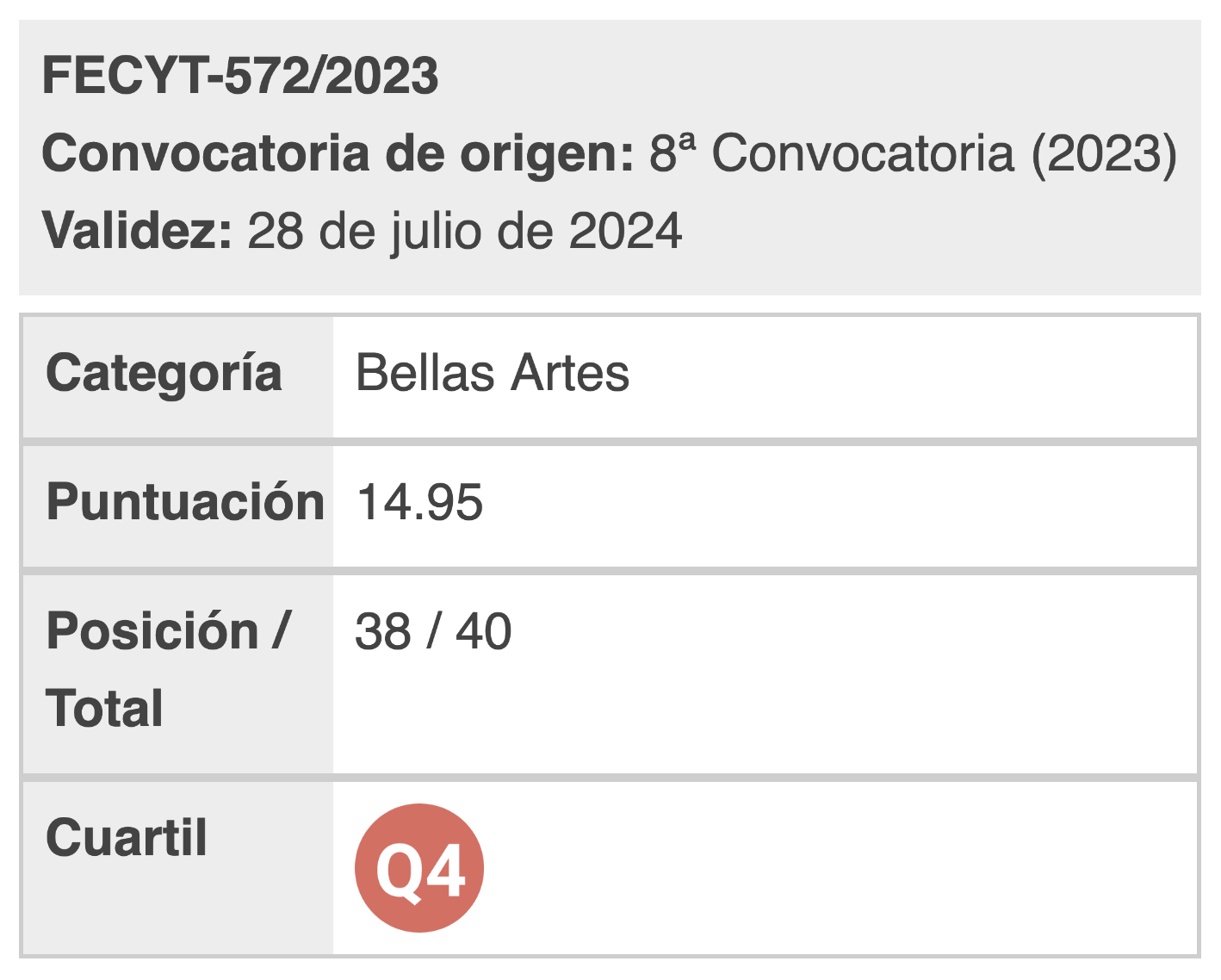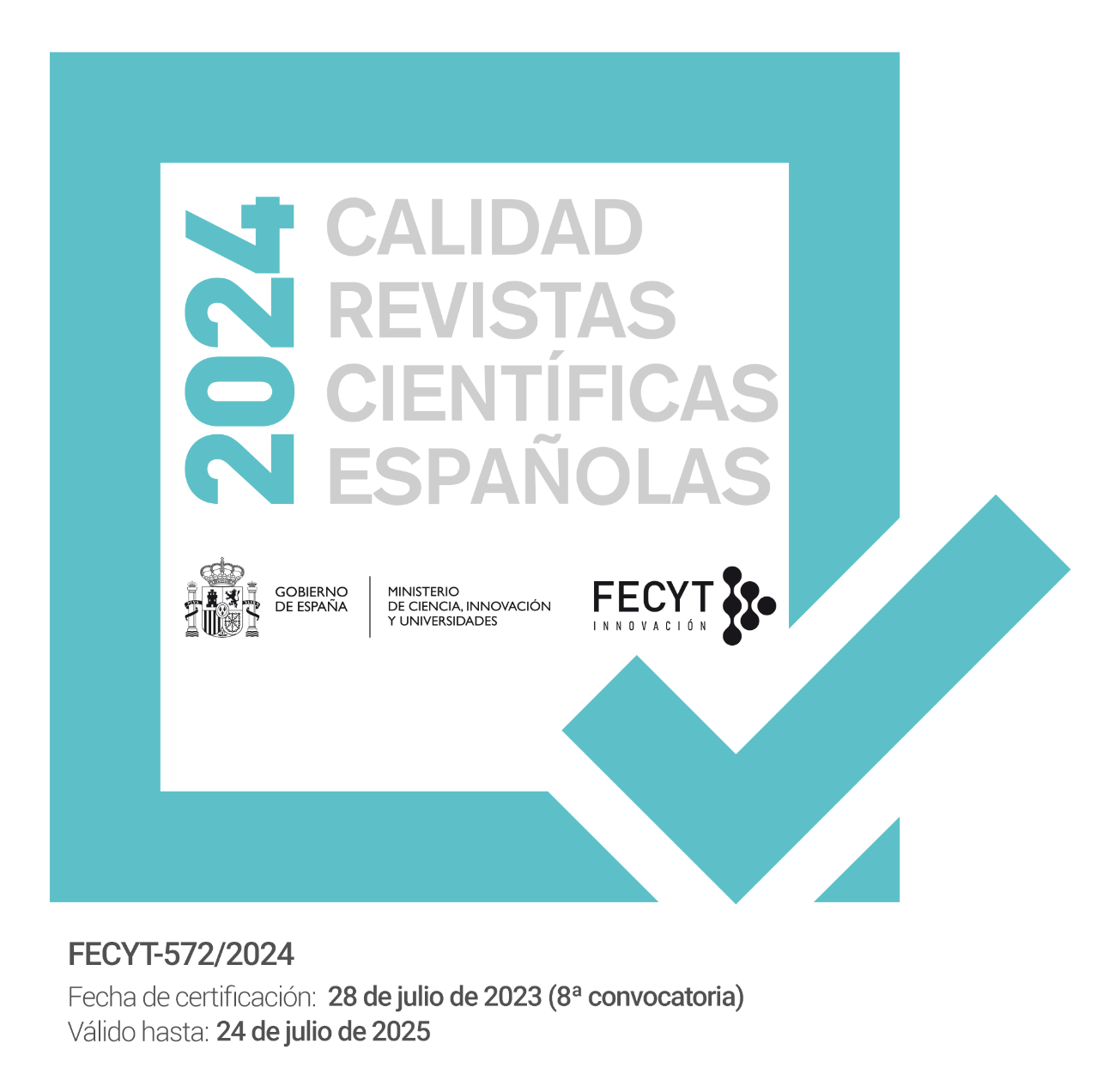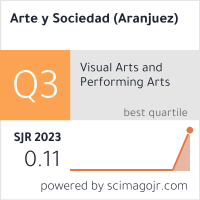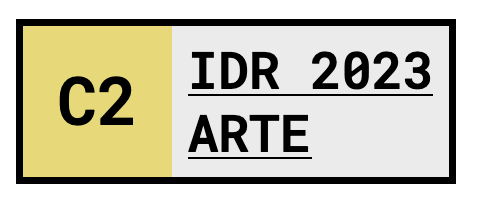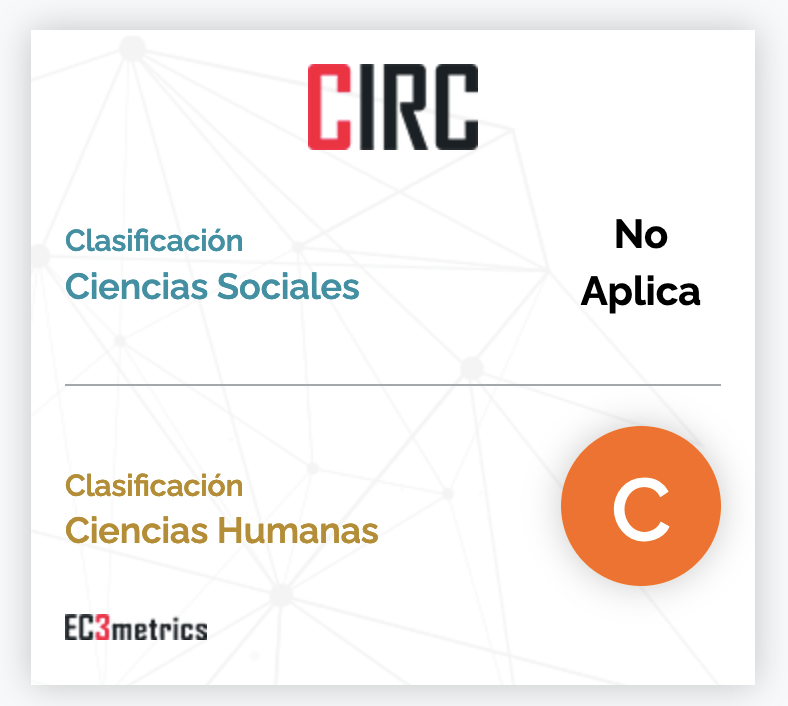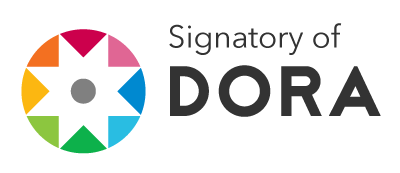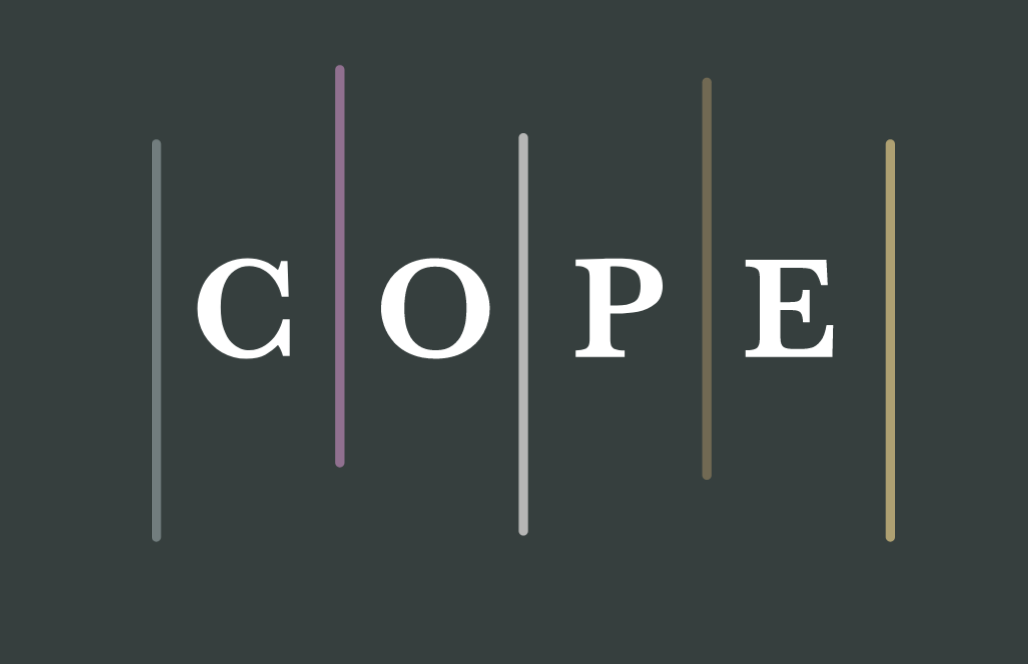ISSN: 2174-7563
Submissions
Submission Preparation Checklist
As part of the submission process, authors are required to check off their submission's compliance with all of the following items, and submissions may be returned to authors that do not adhere to these guidelines.- The submission has not been previously published, nor is it before another journal for consideration (or an explanation has been provided in Comments to the Editor).
- The submission file is in Microsoft Word file format.
- Where available, URLs for the references have been provided.
- The text is single-spaced; uses a 12-point font; employs italics, rather than underlining (except with URL addresses); and all illustrations, figures, and tables are placed within the text at the appropriate points, rather than at the end.
- APA 7ª edition Format. The text adheres to the stylistic and bibliographic requirements outlined in the Directrices del autor/a Author Guidelines, that appear in About the journal.
- If you include figures or graphics from other people or institutions, the authors must have copyright or express permission to publish them in the ASRI journal. Do not forget to enclose them separately together with the other supporting documents of your shipment.
- The article has been written in the native language of one of the authors and has ensured that it meets the stylistic, grammatical, and spelling accuracy expected in a research article.
- If any of the above points is not met, the editorial team will not pass the work to peer review and will notify you that the submission has been rejected and archived.
Artículos
Default section policy
REview
1. Section Objective
The Review Section aims to offer a critical, informed, and rigorous evaluation of recent publications (books, catalogues, exhibitions, digital works, among others) that address topics relevant to the scope of the journal: art, visual studies, digital humanities, aesthetics, critical theory, gender studies, and contemporary culture.
2. Selection Criteria
-
Only reviews of works published within the last three years will be accepted.
-
Reviewed works must hold theoretical, methodological, or critical relevance in their field.
-
Reviews of self-published books by the reviewer will not be accepted.
3. Length and Format
-
Length: between 1,500 and 2,500 words.
-
Style: academic, clear, and well-argued; merely descriptive texts will not be accepted.
-
Suggested structure: introduction to the context of the work, critical summary of its content, evaluative analysis of contributions and limitations, and a closing with a well-supported general assessment.
4. Evaluation Criteria
-
Coherence of argument and analytical quality.
-
Depth of problematization and theoretical articulation.
-
Originality in the critical approach.
-
Writing quality, clarity of exposition, and correct use of APA 7 style.
-
Avoid unnecessary self-citations and justify the relevance of any self-references.
5. Editorial Process
-
Reviews will be evaluated internally by the Editorial Board and may be submitted to blind peer review if deemed necessary due to their complexity or controversial content.
-
Submission does not guarantee publication: only those providing rigorous and relevant analysis will be accepted.
6. Ethical Commitment
-
Authors are expected to maintain a critical, honest, and constructive stance.
-
The review must disclose any potential conflict of interest (e.g., academic or professional relationships with the author of the reviewed work).
7. Periodicity and Publication
-
The section will be published on a rolling basis within each semiannual issue, with a curated selection by the editorial team.
-
Priority will be given to reviews that engage with international works or address emerging academic debates.
Interviews
1. Purpose of the Section
The Interviews section aims to provide a space for critical reflection and academic dissemination through dialogue with specialists, researchers, creators, cultural professionals, and key figures in the fields of the arts, digital humanities, and related disciplines. This section seeks to enrich contemporary debate and highlight innovative trends, projects, methodologies, and perspectives.
2. Scope and Themes
Interviews should focus on topics related to:
- Digital arts, creative practices, and technological experimentation.
- Digital humanities and emerging research methodologies.
- Digital culture, networked society, and processes of cultural transformation.
- Educational innovation in the arts and humanities.
- Relevant recent projects, exhibitions, publications, or research.
- Experiences in data management, digital preservation, and open access.
The section may include interviews in text, audio, or video format, provided that academic quality standards are maintained.
3. Types of Interviewees
Invited interviewees may include:
- Established or emerging researchers.
- Artists, curators, and creators engaged with digital practices.
- Experts in technology applied to culture.
- Directors or coordinators of projects, centers, laboratories, or initiatives aligned with the journal’s profile.
Interviewees will be selected by the editorial team or proposed by authors and editors with prior approval from the Editorial Committee.
The journal will promote:
- Institutional and geographical diversity.
- Gender-equitable representation.
- Inclusion of emerging voices alongside established profiles.
4. Submission and Format Guidelines
- Recommended length: between 1,500 and 4,000 words.
- Language: interviews may be submitted in Spanish, English, or Portuguese (other languages upon consultation).
- Format:
- A brief introduction providing context about the interviewee.
- A body structured in a question-and-answer format.
- Relevant references and links when necessary.
Interviews must be submitted in .docx format or equivalent, following the ASRI editorial template when applicable.
The interview must comply with accessibility and clarity standards consistent with recommendations on good editorial practices and accessible web functionalities.
5. Originality and Rights
- Interviews must be original and unpublished, not previously disseminated in other media.
- The submitting author is responsible for ensuring that the interviewee has given explicit consent for publication.
- Content will be published under the Creative Commons license adopted by ASRI (specify the corresponding license).
- The section will encourage open-access publication and the availability of supplementary materials, in alignment with open-science principles and the promotion of transparency.
6. Editorial Process
- Interviews will undergo an editorial (non‑anonymous) review to assess relevance, rigor, clarity, and thematic alignment.
- The editorial team may request revisions, expansions, or formal adjustments.
- Once approved, the interview will proceed to the editing and layout process.
7. Ethics and Responsibility
- Interviews must uphold basic ethical principles: rigor, accuracy, respect, and transparency.
- Content that is defamatory, discriminatory, or infringes copyright will not be accepted.
- Opinions expressed are the sole responsibility of the interviewee.
8. Gender Perspective and Good Practices
The section commits to:
- Promoting gender-balanced representation among interviewees.
- Avoiding biases or stereotypes in writing.
- Including, when appropriate, discussions or perspectives that highlight the impact of gender in cultural, academic, or technological contexts.
Copyright Notice
All those who decide to publish in the ASRI journal accept the following terms:
- The authors are the only copyright holders, although they agree to publish their work in the journal as a first option.
- The authors accept the terms of copyright under the licence Creative Commons Attribution Licence, allowing their copying, distribution, communication, derivative works, and even commercial uses as long as the credits of the works are acknowledged (authorship of the work, name of the journal, and editorial). The authors will be able to share their works on other platforms, formats, institutional repositories, and books, etc. as long as they publish first in the journal or their publication in the journal is recognized.
- The authors will be able to disseminate their research work on all kinds of platforms such as academia.edu; academic google and institutional repositories, as long as they have previously published their work in the journal.
- The authors of the manuscripts are solely responsible for obtaining the necessary permissions for the images that are subject to copyright.
Assignment of intellectual property rights
- The author grants the first exploitation rights to the ASRI magazine editors on a non-exclusive basis (reproduction, distribution, public communication, and transformation) to exploit and market the work, in whole or in part, in all formats and modes of exploitation present or futures, in all languages, for the life of the work and all over the world. The author or authors of the work declare that they are the only authors responsible for its original content, leaving the publishers exempt from any responsibility or obligation in the event of any legal action that may arise due to the violation of third-party rights, whether intellectual or industrial property, of a trade secret or any other.
Privacy Statement
In accordance with the provisions of the General Data Protection Regulation UE679/2016 and current legislation, we inform you that the data provided in this document will be processed, as Data Controller, by REY JUAN CARLOS UNIVERSITY.
The purpose of processing the data, names, and email addresses entered in this journal is the registration of ASRI authors and readers. Journal of research in Art and Humanities, as well as sending information regarding the journal. They will be used exclusively for the purposes established in it and will not be provided to third parties or used for other purposes.
The authors give their consent, as a legal basis for the processing of their data and they will not be transferred or communicated to third parties, except in the cases necessary to meet the purposes of the magazine, as well as in the cases provided by law.
The authors can exercise the rights of access, rectification, deletion, limitation, data portability, and opposition before Rey Juan Carlos University. Pavia building. Calle San Pascual, s/n. Aranjuez 28013. Madrid.
For more information visit our privacy policy.Para más información visita nuestra privacy policy.
How long do we keep your data?
The personal data collected by the ASRI journal and provided by the authors themselves will be kept in the journal's database, with no other use than contact when necessary. When the relationship ends, it is carried out in accordance with the provisions of EU Regulation 2016/679 of the European Parliament and of the Council of April 27, 2016, (Art 17, 1a), in Law 16/1985, of June 25, of Spanish Historical Heritage and in Law 4/1993, of April 21, on Archives and Documentary Heritage of the Community of Madrid. However, the editorial process requires us to keep the data of authors, reviewers, and guest editors and article 85 of the General Data Protection Regulation (GDPR) allow us to “for archiving purposes of public interest, scientific or historical research or for purposes statistics whose maintenance is of public interest".
Data Protection
ASRI Magazine uses security protocols of the type (https) to avoid attacks and theft of information in all its communications. The Rey Juan Carlos University maintains a double-factor system as an extra security method. All the data transferred by the authors, reviewers, and editors are safely guarded on desktop computers and in backup copies on the Internet of Rey Juan Carlos University, taking into account the rules dictated by the General Data Protection Regulation of the Universidad Rey Juan Carlos. EU (Regulation (EU) 2016/679) (GDPR).

